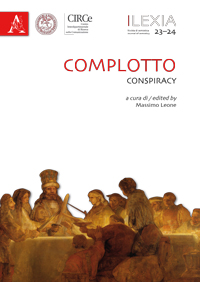Estratto da
LEXIA. RIVISTA DI SEMIOTICA
Complotto
Suspicion, Denunciation, Revolt. On Textual Particularities of Conspiracy Theories
LEXIA. RIVISTA DI SEMIOTICA
Complotto
Suspicion, Denunciation, Revolt. On Textual Particularities of Conspiracy Theories

In the article I reflect on the textual status of conspiracy theories(CTs) from a semiotic point of view. First, I conceptualize CTs as a phenomenoncharacterized by conjectural/speculative meanings (derivingfrom an abduction process) concerning issues of disruption (infringementand deception). Documents play a decisive role in these messagesbecause they are explored as record devices through which one mayinfer something and/or manage veridictive strategies to support it. Inthis first part, I also propose the existence of two major CTs’ categories,distinguished according to the abductive operations that specifically underpinthem: the ‘objective’ CTs, supported by facts, and the ‘subjective’ones, merely based on personal views. In the second part of the paper, Ipropose a semiotic background for the study of the CTs’ textualities, inkeeping with the Semiotic French School. Such epistemic backgroundallows one to outline some of the main axiological, narrative, and discursivespecificities behind CTs, which are therefore conceived as a kindof ‘textual genre’. From this semiotic perspective, I conclude that CTsare not just messages of complaint, anger, and confrontation but alsostrategic texts of (re)mobilization.
| pagine: | 141-154 |
| DOI: | 10.4399/97888548993158 |
| data pubblicazione: | Giugno 2016 |
| editore: | Aracne |








